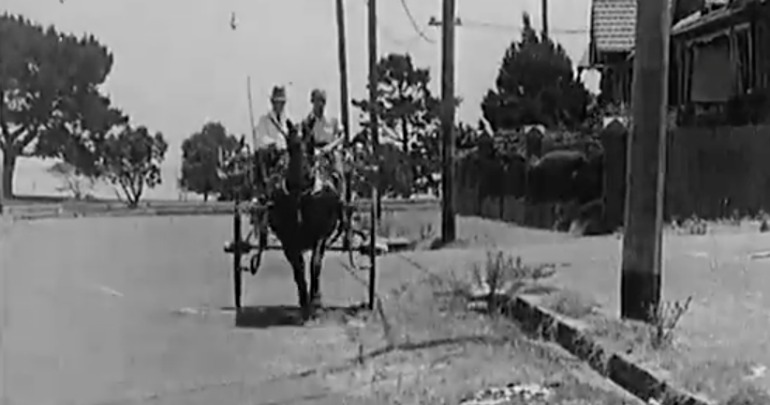
Getting your food essentials these days can be as simple as the click of a button while online shopping.
But do you remember back when it was delivered right to your door?
The ‘milkman’ and baker delivered bread and milk by horse and cart right up to the 1950s and even into the early ’60s in some areas, before they were replaced by trucks and motorised vehicles. In those days, along with milk and break, everything from your post, to your garbage, newspapers, ice, and even sometimes your groceries, were delivered or taken away by hand in a personal service.
Do you remember having a visit from any of these important service-people?

Growing up in the ’40s, ’50s and even ’60s often meant a daily visit from the baker by horse and cart.
While now we’ve grown used to visiting the baker or supermarket to buy a loaf, it was originally hand delivered to each house, fresh from the oven.
Some areas were still using horse and carts through to the early 70s, before sliced and wrapped bread began to take off.
Do you miss hot, crusty bread being home-delivered to your door?

A daily visit from the milkman was a huge part of many people’s lives, with the clinking of glass bottles round the corner a welcome morning sound each day, as your empty bottles were swapped for full ones.
The transport methods used by the milkman, as the deliverymen were fondly named, have changed dramatically over the years. Around the same time as the baker used a horse and cart, the milkman did the same, delivering glass bottles of milk with foil lids to houses in the community.
Many school children at the time may remember collecting the foil lids for competitions.
Delivery trucks and motorised carts started replacing the horse and cart in the ’60s and ’70s, and now home delivered milk is rare.
Do you still have your milk delivered? What are your fondest memories of milk carts in the past?
Being a paper boy, or sometimes girl, was a first job for many Australian kids.
Often choosing to ride a bike from house to house, they’d stuff the paper in the post boxes, or throw it over the fence, while shouting a swift “hello” or “coo-ee”.
This carried on for decades, and only began to lose popularity in the late ’90s as more people began reading their newspapers online.
Read more: Grow up with a dunny? Australia’s first ‘Pooseum’ needs your help
Who doesn’t love the classic sound of an ice-cream van or bike arriving on your street, blasting out a high-pitched tune as it went?
But it wasn’t always just these sweet treats delivered to neighbourhoods, as an ice man used to make the rounds too. Before fridges, people relied on an ice chest in their homes to keep their perishables cold.
The ice man would come round houses with a big block of ice from his van, before taking out tongs to deliver pieces of it into each homeowner’s ice chest for the day.
While the postie is still a well-known and popular visitor to homes across the globe, they’ve had some very dramatic advances in their transport methods.
In the past, when people relied solely on letters to communicate with each other, the postie would often visit twice a day with a thick wad of envelopes for each house in his bag, while now in Australia they only call every second day or less.
From a horse and cart, to bicycles and eventually vans and scooters, though, they’re still a familiar sight in most Aussie suburbs.
Read more: The great Aussie backyards we grew up in
Garbage trucks are fitted with mechanical arms to pick up bins and deposit rubbish inside now, but it wasn’t always the case.
Who remembers when the garbo would run behind the truck, picking up people’s bins, and chucking them in the back? He was often clad in just a pair of shorts and his work-boots as he lifted bins in the harsh Aussie summer. Perhaps you left the garbos a six-pack of beer or a bottle of spirits as Christmas present or as a treat now and again to say a thank you?
The ‘dunny men’ would collect the waste buckets from the backyard outhouses. Their proper name was the night-soil men, and they used horse-drawn carts and then trucks to do what was a very unpleasant job.